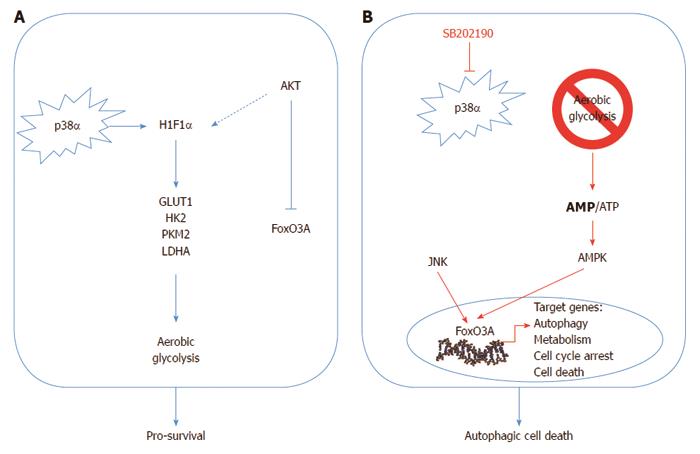Copyright
©2014 Baishideng Publishing Group Inc.
World J Gastroenterol. Aug 7, 2014; 20(29): 9744-9758
Published online Aug 7, 2014. doi: 10.3748/wjg.v20.i29.9744
Published online Aug 7, 2014. doi: 10.3748/wjg.v20.i29.9744
Figure 1 Schematic representation of the p38α involvement in colorectal cancer.
A: p38α is involved in the regulation of key metabolic cascades in colorectal cancer (CRC), sustaining HIF1α protein expression and the transcription of HIF1α target genes, such as GLUT1, HK2, PKM2 and LDHA; B: p38α blockade causes a significant decrease in the intracellular levels of ATP, which correlates with a time-dependent reduction of HIF1α protein levels and the consequent decrease in HIF1α target gene expression and phospho-activation of AMPK. AMPK activity is required for the nuclear accumulation of FoxO3A and the subsequent activation of FoxO3A target genes involved in autophagy, metabolism, cell cycle arrest and cell death, leading to autophagic cell death in CRC in vitro and in vivo. PI3K/Akt and JNK kinases regulate the nuclear/cytoplasmic shuttling of FoxO3A protein by phosphorylation.
- Citation: Grossi V, Peserico A, Tezil T, Simone C. p38α MAPK pathway: A key factor in colorectal cancer therapy and chemoresistance. World J Gastroenterol 2014; 20(29): 9744-9758
- URL: https://www.wjgnet.com/1007-9327/full/v20/i29/9744.htm
- DOI: https://dx.doi.org/10.3748/wjg.v20.i29.9744









